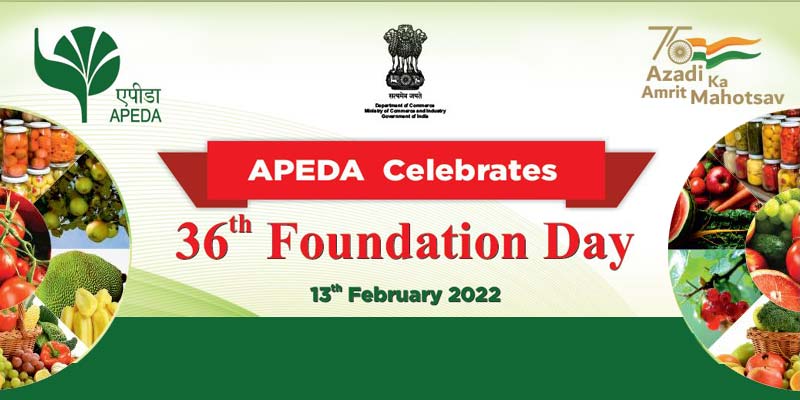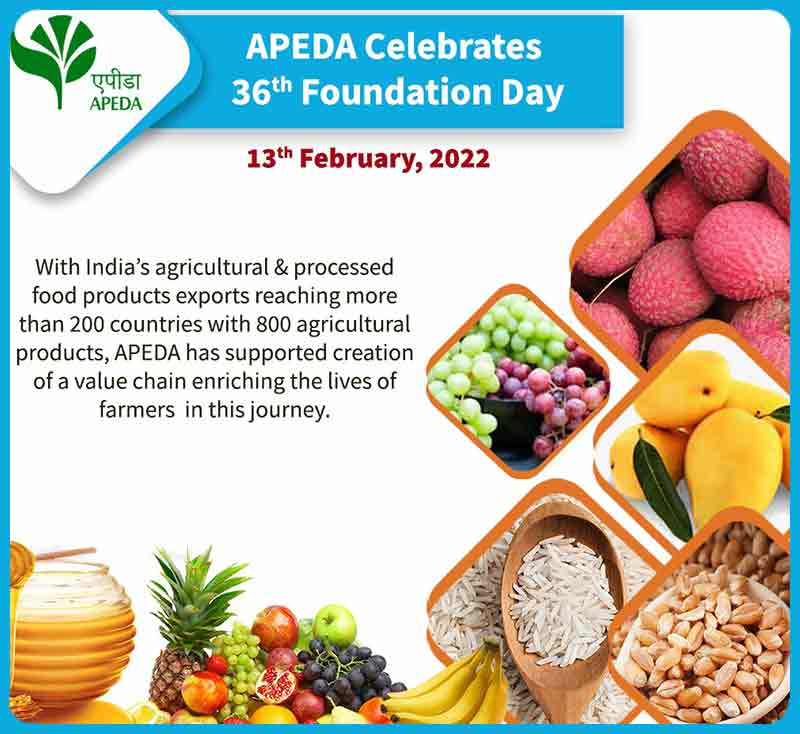- India
- Feb 14
Explainer / Major initiatives of APEDA and its impact
The Agricultural Products Export Development Authority (APEDA) celebrated its 36th Foundation Day on February 13.
The commerce ministry said that exports of agricultural and processed food products through APEDA are expected to exceed the target of $23.7 billion in the current fiscal. Exports of agricultural and processed food products under APEDA basket rose to $20.67 billion (Rs 1,53,049 crore) during 2020-21.
What is APEDA?
• The Agricultural and Processed Food Products Export Development Authority (APEDA) was established by the government under the Agricultural and Processed Food Products Export Development Authority Act passed by Parliament in December 1985. The Act came into effect on February 13, 1986.
• APEDA, which replaced the Processed Food Export Promotion Council (PFEPC), has its headquarters in New Delhi.
• In order to reach out to exporters in different parts of the country, APEDA has set up five regional offices in Mumbai, Bengaluru, Hyderabad, Kolkata and Guwahati and 13 virtual offices in Thiruvananthapuram, Bhubaneshwar, Srinagar, Chandigarh, Imphal, Agartala, Kohima, Chennai, Raipur, Ahmedabad, Bhopal, Lucknow and Panaji.
• APEDA has been entrusted with the responsibility of export promotion and development of 14 agricultural and processed food product groups listed in the Schedule to the APEDA Act. In addition to this, APEDA has been entrusted with the responsibility to monitor the import of sugar as well.
Major initiatives of APEDA and its impact
• The government initiated development of National Programme for Organic Production (NPOP), which was approved on May 2, 2001 and APEDA designated as the Secretariat for NPOP.
• Considering the importance of food safety and traceability required by the importing countries of developed economies, APEDA took a number of initiatives in the area of quality development such as preparation of standards, procedures for identified potential products, development of residue monitoring protocol, recognition of laboratories and implementation of traceability systems, etc.
• APEDA pioneered its first traceability system for export of grapes to EU countries in the year 2005-06. First, the system was made paper-based and then made IT enabled which gave birth to the first traceability system in the horticulture sector as GrapeNet. After the success of traceability implementation in the grapes sector, the same was replicated for other products such as peanut (Peanut.net), Organic products (Tracenet) and meat products (Meat.net). The traceability systems for more products are being developed for further implementation.
• The APEDA website is providing online facilities for the issuance of Registration-cum-Membership Certificate (RCMC), Registration-cum-Allocation Certificate (RCAC) and submission of financial assistance schemes applications.
• In its endeavour to promote agro exports, APEDA, under its Plan Scheme titled ‘Agriculture Export Promotion Scheme of APEDA’ provides financial assistance to the registered exporters under sub-components of the scheme — market development, infrastructure development, quality development and transport assistance.
• Aiming to take export of agricultural products to a new level, APEDA promoted IT-enabled activities for ease of doing business in the promotion and development of exports from India.
• APEDA has undertaken initiatives like paperless office (re-engineering, digital signatures, electronic payment facility), APEDA mobile app, phase-wise delivery of online services, monitoring and evaluation, uniform access, and virtual trade fair to make governance more efficient and effective.
• APEDA has been focusing on promotion of exports of locally sourced Geographical Indications (GI) tagged as well as indigenous, ethnic agricultural products. New products and new export destinations have been identified and accordingly the trial shipments have been facilitated.
• As on date, there are 417 registered GI products and of them around 150 GI tagged products are agricultural and food GI out of which more than 100 registered GI products fall under the category of APEDA scheduled products (cereals, fresh fruits and vegetables, processed products, etc).
• In 2020-21 and in the current fiscal, some of ethnic and GI tagged products exported by India include dragon fruit, patented village rice, jackfruit, jamun, Burmese grapes, dehydrated mahua flowers, puffed rice. GI varieties of mango, GI tagged Shahi litchi, Bhalia wheat, Madurai malli, Mihidana, Sitabhog, Dahanu Gholvad Sapota, Jalgaon banana, Vazhakulam pineapple and Marayoor jaggery, etc.
• The implementation of revamped Agri Export Policy is also in the final stage as 21 states and two UTs (Ladakh and A&N Islands) have already finalised the state specific action plan.
• Country specific agri-export strategy reports have been prepared for 60 countries in consultation with the Indian embassies to tap the opportunities emerging during the COVID-19 pandemic.
• APEDA is working with the state governments for ensuring traceability and market linkages for farmers for promoting exports. It is giving thrust on ensuring digitisation of land records and formalisation of tenancy for the farmers, which helps in boosting exports.
• A Market Intelligence Cell has been constituted in APEDA and the activity of dissemination of E-market intelligence reports comprising detailed market analysis has commenced.
• A Farmer Connect Portal has also been set up by APEDA on its website for providing a platform for Farmer Producers Organisations (FPOs) or Farmer Producer Companies (FPCs), Cooperatives to interact with exporters. Around 3,295 FPOs/FPCs and 3,315 exporters have been registered in the portal so far.
• For promoting use of hybrid technology, APEDA has integrated a blockchain solution into its GrapeNet traceability platform. The blockchain solution, called APEDA Trust Chain, helps track all the details of the export consignment, right down to the location of the vineyards.
• APEDA has taken a giant leap in making landlocked Purvanchal a new destination of agri export activities by developing Varanasi Agri–Export Hub in a record time. The Varanasi region, where export activities were negligible because of lack of basic infrastructure, is now abuzz with agri export activities. Varanasi region has recorded exemplary changes in the export scenario and registered many first-of-its-kind achievements in a very short span of time as about 20,000 tonnes of agri produce have been exported from Purvanchal region in the last six months.
Manorama Yearbook app is now available on Google Play Store and iOS App Store


